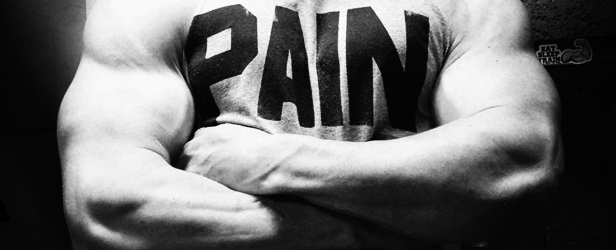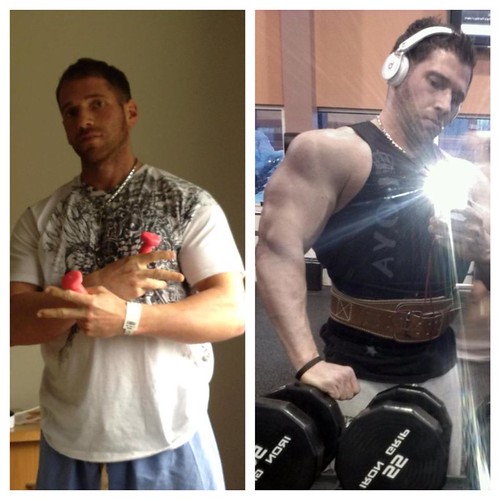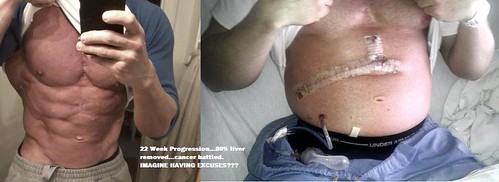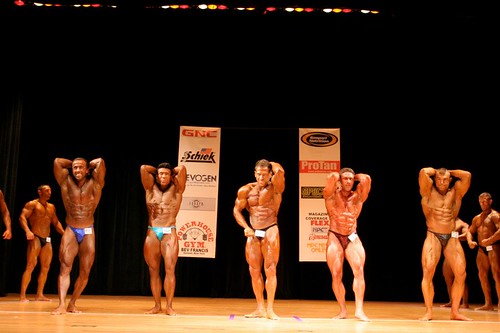
What really is “hardcore?" I am not hardcore. Lifting weights and eating food is not hardcore. I see a lot of things described as “hardcore” these days, and it makes me sad. People have to make choices in life, and some of them take the easy way out, especially in the bodybuilding world. You see this stuff every day...Guys doing pornography for pay, athletes selling their souls for “supplements,” and others neglecting their children because they claim they “don’t have the money” to pay for them. Since when is bodybuilding or powerlifting a full-time job? Since when do people not have the time to make an honest living? Ronnie Coleman worked as a police officer in Texas the whole time he was competing, and he made time to eat, rest, and train. Jay Cutler, the consummate professional, has built an empire around his name, and he started out by working in construction. Arnold Schwarzenegger and Franco Columbu came to this country hungry, and they worked as bricklayers in the hot southern California sun. Yet, both still became champions. I don’t believe most of this is hardcore. In fact, I believe that “hardcore” is facing adversity and skullf*****g it to sleep. When the word “hardcore” comes up, there’s one person who comes to my mind, and that's Brendon. Brendon is originally from Jacksonville and used to train at the same gym I did, before I started full-time at Adams. This is what facing adversity means: Not being lazy and not making excuses as to why you have to take the easy way out. —Brian Carroll
*****
In the winter of 2012, after a two-year layoff from bodybuilding competitions, I was preparing for my return to the stage in Boston at the Jay Cutler Classic. I took a couple of years off in order to make some drastic improvements to my physique in the attempt to be competitive at the national level. During that time, I was also working on my nursing degree. Training and health in general were clicking very well—aside from a minor back injury. I never had any indication that something serious was manifesting itself inside my body. My blood work had always been very positive, and the only sign that could have been considered a red flag was elevated liver enzymes—a condition that dated back to middle school. However, on April 19th, I noticed a strong stomach ache building while I was driving home from class. This was very different from a normal upset stomach because it didn't cause me to head toward the bathroom. The pain was radiating into the upper right quadrant of my rib cage. Twenty-four hours later, I found myself in the emergency room.
The CT scan showed that I had some “massive growths” on my liver, with one of them containing an arterial split that was causing massive bleeding into my abdominal cavity. Thus, I was quickly med-flighted into Boston for emergency surgery in order to stop the bleeding. I then spent a week in ICU to recover from the trauma. When they released me, it was understood that recovery from the bleeding would take six to eight weeks. I was advised that once the bleeding damage was under control, I was looking at major surgery to remove 80 percent of my liver. To this day, they've never seen a tumor growth so extensive in someone my age, and more importantly, malignant liver tumors. This is usually a female-dominant illness that’s rarely ever cancerous. I had liver resection surgery on June 22, 2012. I then went back for a follow-up visit not long after only to find out that they were sending me back for a second major liver resection. For that one, they would reopen the 15-inch multidirectional incision and remove another major portion of my liver that still contained cancerous tumors. This meant that I would be undergoing a total of three major surgeries (only six to eight weeks apart) over the course of that year. The third surgery would be a last ditch attempt to remove whatever cancer was left in my liver. Whatever was there would have to stay. Chemotherapy and a liver transplant were things I was not eligible for.
Following my recovery from the last surgery, I was given two years to live and prescribed an oral chemotherapy drug to keep the spread of the cancer and the tumor growth to a minimum. I would either stay on the drug until I could no longer tolerate the side effects or until I was overcome by cancer. So, on that October day, I drove home from that appointment knowing I was on my own. Nothing they’d offered was acceptable to me. I would not take their medicine, and I would not accept the bullshit statement that I only had two years left on this earth. Why would I accept that? Throughout my recovery battle, I was told that I would never get back in the gym again, that I’d never be able to eat a diet suitable for intense training, and that I’d be lucky if I could sustain a healthy weight to keep my immune system strong enough to battle cancer.
None of what they predicted was true. They told me after every surgery that I’d be in ICU for a week and then on the general floor for another week. Well, I was home in four days every time, and I was on my treadmill doing cardio on the fifth day. I packed Tupperware to eat in the ICU, sneaking my food in because I wasn't allowed to eat anything but popsicles. I was eating egg whites and oatmeal and taking my supplements because I felt that I knew my body better than they did. On the seventh day home after each recovery, I spent a solid hour taping and wrapping my stomach incision, positioning the drainage bottles, and making my way to the gym to start training again. I was taking baby steps, but it was either sit at home and take painkillers, or put my headphones on and get my training fix in.
With every surgery, I was told that I was crazy for doing what I was doing. They gave me a hard time about everything, but I stayed true to what I knew and kept grinding away, knowing that one day I’d see a ray of light shining through the darkness. In the winter of 2013, after four months of intense natural cancer treatment options I had put together myself, I returned for MRI and CT scans. The five remaining tumors had shrank so much that they were barely visible on the image scans. The doctors at Massachusetts General were blown away, but they still won’t give credit to anything I did on my own. Instead, they called it “luck.” Well, I don’t believe in luck. In Spring 2013, I decided to act on my burning desire to return to the stage in Boston in order to finish what I’d started in 2012. This time, I had to stay true to the cancer therapy program I had created while getting into competition shape. This meant no supplements—just food and sweat. It was the most grueling challenge I had ever faced in my fifteen years of training and four years of competing...but I've never enjoyed suffering and resistance so much. There were many nights when I was laid up in the hospital with a time limit on my life that I dreamed about competing and doing what I loved.
This time around, I was not about to let this moment slip from my grasp. Every bit of discomfort was beautiful because it was simply the meaning of progression and being alive. I won the middleweight open class at the NPC Jay Cutler Classic in Boston this past May. I would have liked to have moved on to Team Universe, but I made a promise to keep my priorities in check. So, immediately following the show, it was back to the health grind.
The one thing that never changes each day, whether my life is promised or is about to end, is that I wake up, do my cardio, eat my meal, and train my ass off. That’s a blessing and a gift. It’s something I’m thankful for, and I’ll forever show my appreciation for this gift by giving 100 percent every day—and always with a smile.
How I Did It: Nuts and Bolts
After I found out that they were only giving me two years to live, and after attempting to tolerate the chemo meds, I set out full-force to find out what my options were. I put aside nursing school in order to devote my time to studying and learning how to survive this. With extensive research, I looked into the ideas of raw vegetable juicing, alkalinizing green food supplements, Chinese herbal medicine, systematic enzyme therapy, and all possible forms of immunity-boosting nutrition.
The main ideas I touched on were raw veggie juicing and green food supplements, along with all organic eating in an effort to create an extreme alkaline environment in my body where cancer was at an extreme disadvantage. I employed a low-protein, ketogenic-style diet that was roughly 70 percent powerhouse vegetables juiced to extract the beneficial raw enzymes and nutrients in mega-doses.
For a period of three months, I juiced approximately 10-15 pounds of vegetables per day, which came out to five 20-ounce servings throughout the day. A typical meal would be three ounces of organic-fed chicken, 20 ounces of fresh juice, and a plethora of spirulina/chlorella/chlorophyll-type superfoods. I incorporated a juice fasting day once per week on my rest days, preceding leg training. I found that a fasting day actually enhanced recovery immensely. This wasn’t a true fast because I was consuming 20 ounces of juice and 10 grams of BCAAs every few hours, but it was a huge relief to my digestive system, and it also cleansed my internal organs very well. The following day, when food was added back in, my energy and training pump was amazing.
The trick was incorporating all these methods back into a bodybuilding-style protocol as I ramped back into training and ultimately contest prep. It gets very complex with carb-cycling mixed with ketogenic days, juice fasting, and nightly detox methods, but there was no other option. That was fine with me. Just get it done.
Built By Discipline Nutritional Consulting
Brendon can be reached at brendonbdoherty@gmail.com
Related Articles:
The Minx: Storming the Beaches of Normandy











